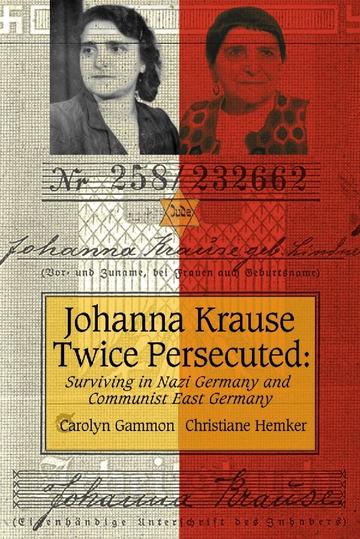Persecuted as a Jew, both under the Nazis and in post-war East Germany, Johanna Krause (1907–2001) courageously fought her way through life with searing humour and indomitable strength of character. Johanna Krause Twice Persecuted is her story.
Born in Dresden into bitter poverty, Krause received little education and worked mostly in shops and factories. In 1933, when she came to the defence of a Jewish man being beaten by the brownshirts, Krause was jailed for “insulting the Fürer” After a secret wedding in 1935, she was arrested again with her husband, Max Krause, for breaking the law that forbade marriage between a Jew and an “Aryan.”
In the years following, Johanna endured many atrocities—a forced abortion while eight months pregnant and subsequent sterilization, her incarceration in numerous prisons and concentration camps, including Ravensbrück, the notorious women’s camp near Berlin, and a death march.
After the war, the Krauses took part enthusiastically in building the new socialist republic of East Germany—until 1958, when Johanna recognized a party official as a man who had tried to rape and kill her during the war. Thinking the communist party would punish the official, Joanna found out whose side the party was on and was subjected to anti-Semitic attacks. Both she and her husband were jailed and their business and belongings confiscated. After her release she lived as a persona non grata in East Germany, having been evicted from the communist party. It was only in the 1990s, after the reunification of Germany, that Johanna saw some justice.
Originally published as Zweimal Verfolgt, the book is the result of collaboration between Johanna Krause, Carolyn Gammon, and Christiane Hemker. Translated by Carolyn Gammon, Johanna Krause Twice Persecuted will be of interest to scholars of auto/biography, World War II history, and the Holocaust.
Born and raised in New Brunswick, Carolyn Gammon moved to Berlin in 1992. Her poetry, prose, and essays have appeared in anthologies in North America and Great Britain, and in translation.|Christiane Hemker lived in various German cities before moving to Dresden in 1993. Her field is archaeology, in which she is widely published. Her volunteer work with union and social politics, focusing on women’s rights, introduced her to Johanna Krause and her story.



